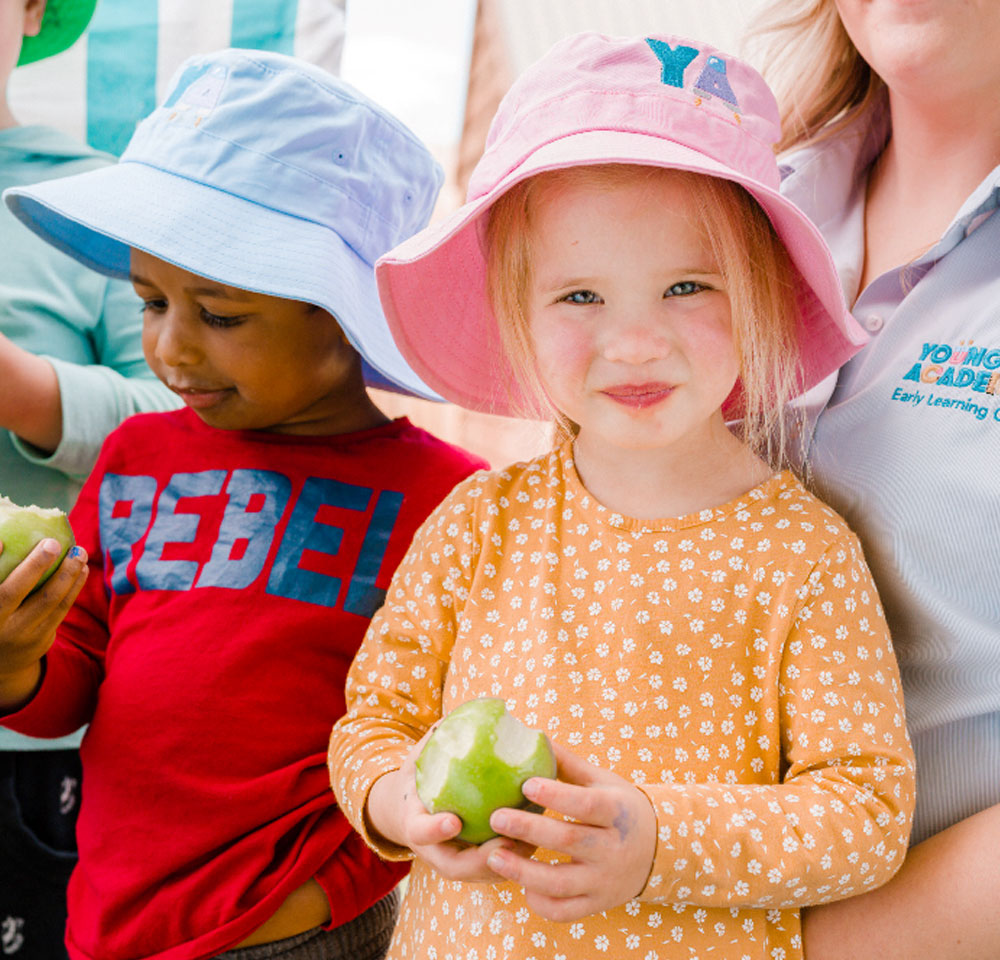With the growing obesity rates in Australia, learning about healthy lifestyles and incorporating healthy eating in childcare is extremely important for children's wellbeing and overall health. It is vital to implement these healthy eating practises at home from a young age. Doing so will equip children when they become more independent and make their own eating decisions.
Young children need to establish healthy eating patterns and exercise routines in childcare for a healthy life. If not handled appropriately, children can fall off track and into the 'overweight' category.
“In 2014–15, 1 in 5 (20%) children aged 2–4 were overweight or obese—11% were overweight but not obese, and 9% were obese.” - AIHW
A key part of ensuring children are embracing healthy eating practices is by modelling positive eating habits. Whether in childcare or at home, exemplifying healthy eating will encourage children to adopt these behaviours themselves.
Nutrition is the umbrella term that describes how the food you eat meets one's body's dietary needs. If children have a proper diet, it means they are eating the right type and right amount of food. If a child's nutrition is poor, this means that they are eating the wrong foods and are not providing their body with the right nutrients. Every food has its own nutritional value making it is essential to ensure children are choosing and eating items that have adequate nutritional intake.
A well-balanced diet combined with regular physical activity is the basis for a healthy lifestyle. Children are precious little humans and need to provide their bodies with the right nutrients to grow and develop. It is also incredibly crucial that children are eating healthy at childcare and at home as 'poor nutrition can lead to reduced immunity, childhood obesity, impaired physical/mental development and reduced productivity' (World Health Organisation).
Good nutrition is essential for:
-
Growth and development
-
Healthy brain functioning
-
Prevention of illness
-
Repair of cells
-
Good concentration
-
Maintaining energy
-
Overall wellbeing
Some of the most essential nutrients for children are:
-
Protein - builds muscles (found in eggs, lean meats and cheese)
-
Calcium - strengthens bones (found in milk, yoghurt and seeds)
-
Carbohydrates - provides energy (found in whole grain bread, potatoes, fruits)
-
Iron - healthy blood and energy (found in legumes, lamb, spinach, quinoa, lentils)
-
Vitamins - help heal wounds and boosts the immune system (found in fruit, vegetables, grains, milk and dairy foods)
-
Minerals - strengthens bones and improves energy levels (found in meat, cereals, fish, milk, nuts, fruits and vegetables)
-
Water - involved in every bodily function and is essential for life
-
Essential fats - helps the body absorb other vitamins (found in fish, avocados)
An amazing way that we at Young Academics like to incorporate healthy eating in childcare is to involve children in the preparation of food, helping them understand different food groups and nutritional values. This provides them with a learning experience and allows them to understand what they are placing into their bodies.
Childcare nutritional intake aiming for healthy eating habits
| Essential food group | Minimum number of serves during ‘childcare’ hours | Average serve per child |
| Grains | 2 | 1 serve = 1 slice of bread or 30g of breakfast cereal, cooked rice or cooked pasta |
| Dairy foods & alternatives | 2 | 1 serving of:
|
| Meat & alternatives | 1 | 1 serving of:
|
| Fruit | ½ | 1 serving of:
|
| Vegetables | 1 | 1 serving of:
|
| Fat | 1½ | 1 serving of:
|
Recipe snack to help encourage heating eating habits:
-
Berry Smoothie ice-blocks:
-
Blend orange juice, raspberries, blueberries, raspberries and strawberries until smooth.
-
Pour them over an ice-block mould and place lids on them
-
Freeze for about four hours or until frozen
-
-
Caterpillar grapes:
-
Using celery, and grapes to create a caterpillar. A fun and exciting way of encouraging kids to eat healthily and reach their daily fruit and vegetable intake.
-
Cut celery into long pieces, spoon peanut butter along the centre of celery and top each celery with grapes. If you want to be extra creative, attach other vegetables to make up for the face of the caterpillar
-
A child's brain is one of the most critical organs in the body and uses more energy than any other organ. Everything from learning to memory and attentiveness is affected by the foods we consume. The reason why healthy eating habits are essential for children is that these practices will yield benefits that are measurable later on in life.
-
Benefits for the body:
-
Children love to be active and are constantly running, climbing and jumping. A nutritious diet helps these precious bodies grow strong, it and it improves their overall wellbeing. Children need proper nutrition in order for them to have the energy to live life to the fullest. It also protects them against malnourishment, maintains the immune system, prevents obesity and reduces the risk of chronic disease.
-
-
Benefits for the mind
-
In this fast-paced world, children are faced with the struggle of choosing chicken nuggets or cauliflower. They can be overwhelmed by the world of ‘convenience’ surrounding unhealthy food choices. However, it is important that healthy eating habits are established in childcare and at home for them to develop habits they can continue to use throughout life.
-
Sometimes, a simple meal can become a fun and exciting learning experience. From health education to celebration to culture, healthy and child-friendly eating habits can help your child grow. Some simple ideas for healthy food snacks include:
-
Keep snacks simple - a piece of fruit or handful of nuts
-
Create colourful plates with a variety of vegetables
-
Involve little ones in the cooking process, they learn through explaining and watching
-
Limit sugary drinks
-
Don’t rush mealtimes
-
Do not punish a child for not eating
-
Avoid using food as a reward
At Young Academics, we implement nutrition programs within our daily routine to meet each child's unique nutrient needs.
Our delicious and seasonal menus are developed by a Registered Dietitian and are prepared by trained cooks on-site daily. We provide all children with breakfast, morning tea, lunch, afternoon tea and a late snack.
We have included a 360-degree approach to health in our very on Nutrition Program. Learn more about this program here or alternatively, you can call us on 1300 668 993 to learn more.



 BACK
BACK



